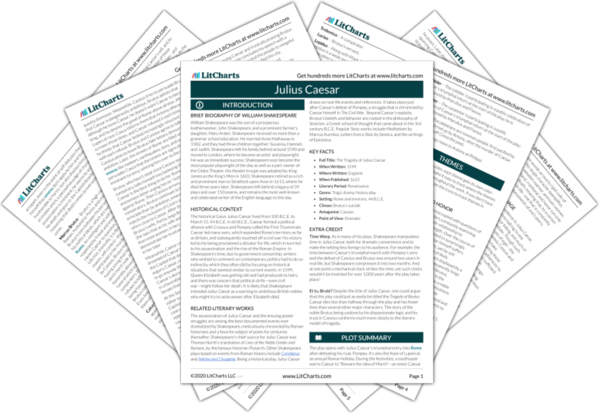Summary
Analysis
Cassius explains that Brutus has wronged him by condemning Lucius Pella for taking bribes, whereas Cassius’s letters in Lucius’s defense were ignored. Brutus accuses Cassius of letting people off for offenses in exchange for bribes. He says that since they killed Caesar for justice’s sake, they shouldn’t “contaminate” their cause by accepting bribes now—Brutus would “rather be a dog […] than such a Roman.”
Earlier, when Cassius and Brutus disagreed over whether to assassinate Antony, a rift appeared; it reasserts itself here. The conflict is between Brutus’s stubborn sense of honor and Cassius’s cold pragmatism.
Themes
Quiz
Test Yourself
Cassius is insulted and says that he's an abler soldier than Brutus. Brutus disagrees, saying he is not afraid of Cassius. Cassius says that even Caesar never insulted him this way, and Brutus says that Cassius was too afraid of Caesar to give him reason. Brutus continues, saying that Cassius denied him money for his army, even though Cassius is richer than he, because of his corruption. Cassius says that Brutus is being unfair. Brutus accuses Cassius of loving flattery. Cassius makes a show of asking Brutus to kill him, if he really thinks him so dishonorable.
As the two men argue about Caesar, they begin to mirror him. Cassius's dramatic gesture of baring his chest and asking for death is similar to Caesar’s gesture when he thought the crowd was glad he’d refused the crown. Brutus's refusal to repeal the officer's punishment is identical to the argument Caesar made just before his murder (that he was as fixed in his judgments as the North Star). Caesar, then, was a successful politician because he combined elements of both Brutus and Cassius.
Themes
Quiz
Test Yourself
Brutus tells Cassius to sheathe his dagger, explaining that his quick temper is just as quickly expired. Cassius apologizes for his hasty temper, too, and they shake hands. Outside, a poet speaks to the guards, saying that in light of their mutual grudge, it’s not wise for the two to be left alone. Brutus and Cassius emerge and mock the poet’s poor rhymes, sending him away.
Like the last comic scene with Cinna the poet, this brief interlude breaks tension before the focus changes. The original actor may have impersonated one of Shakespeare's rivals.
Themes
Quiz
Test Yourself
Brutus and Cassius dismiss their guards and servant. Brutus explains that his temper stems from grief—Portia is dead. She killed herself by swallowing coals when she feared that Antony and Octavius would defeat Brutus. Cassius is horrified; Brutus doesn’t want to discuss it further. They drink wine in honor of their reconciliation.
Portia's suicide refreshes the audience's sympathy for Brutus, and helps explain the argument that just occurred, since losing his temper is so uncharacteristic of Brutus. Like the time she stabbed herself in the thigh, Portia’s manner of death is gruesome, as if intended as final proof of her “unfeminine” toughness.
Themes
Quiz
Test Yourself
Get the entire Julius Caesar LitChart as a printable PDF.

Titinius and Messala enter, and the men compare notes regarding the advance of Octavius and Mark Antony. Messala reports that Octavius, Antony, and Lepidus are reported to have executed a large number of senators, including Cicero. Messala also reports Portia’s death, and Brutus stoically accepts the news, not revealing that he already knew. Brutus and Cassius debate whether it’s best to march to Philippi to confront Antony and Octavius. Cassius thinks it’s best for them to remain well-rested, in a defensive position, while Brutus argues that if Antony’s army marches to meet them, they’ll collect allies along the way, arriving in strengthened numbers. Cassius concedes to Brutus’s reasoning, and they bid one another goodnight.
By implication, Antony governs in a far more tyrannical manner than Caesar was accused of doing. Brutus, not normally given to acting, puts on a show of stoicism regarding Portia’s death, suggesting that he’s more deeply affected by the event than he dares let on. Brutus also employs his superior logic to successfully argue for the army’s next movements.
Themes
Literary Devices
Quiz
Test Yourself
Two servants, Varrus and Claudio, and Lucius enter Brutus’s tent. Lucius plays a song, and everyone but Brutus is soon asleep. Brutus settles down to read, but the Ghost of Caesar suddenly appears, calling himself “Thy evil spirit, Brutus.” The ghost tells Brutus that they will meet again at Philippi; then he vanishes. Brutus wakes the others, who deny having seen anything. Then Brutus sends word to Cassius that they should prepare to march.
Caesar’s ghost implies that by killing him, Brutus has done something wicked, and his appearance seems like an omen of Brutus’s death. Here, however, Brutus does not seem much affected by the warning.
Themes
Quiz
Test Yourself












